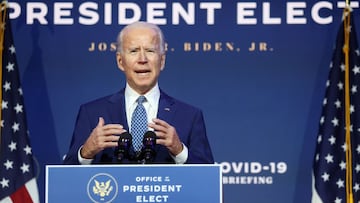Biden wins US Election 2020: what happens if the Senate has a Republican majority?
A division of power in government is common in the US with the Republicans and the Democrats often splitting control of the White House and Congress.


Joe Biden may have been announced as President Elect but there are still some crucial decisions to be made on how America will be governed for the next four years. The presidential election appears to have been a pretty resounding win for the Democrats but the picture is less clear in the Senate, when both parties retain hope of having a majority when the Upper House reconvenes next year.
Senate Minority Leader Chuck Schumer released a statement after Biden’s victory was called, saying: "A Democratic majority in the U.S. Senate would be the biggest difference maker to help President-elect Biden deliver for working families across the country”.
Sen. Chuck Schumer: "There has been no evidence of any significant or widespread voter fraud. Joe Biden won this election fair and square. The margins of his victory are growing by the day." pic.twitter.com/bvAFNdVAw5
— The Hill (@thehill) November 9, 2020
All elections in Georgia, not just those for the Senate, require the winning candidate to pick up over 50% of the votes cast. This year neither of the state’s two Senate races had a majority winning so a run-off will be held on 5 January, with both the Democrats and the Republicans holding out hope of securing the vital seats needed to give them a majority in the Senate.
Why is control of the Senate so important?
Although President Elect Biden will be the head of the government, he would rather govern by concensus than executive order. Therefore most large-scale bills will need to pass Congress before they can be signed into law.
The Democrats currently have a considerable lead in the House of Representatives and look certain to become the majority party again, but need two more seats in the Senate to reach 50. Although 50 out of 100 would only see them level with the Republicans, in the case of a tie the deciding vote would go to Democratic Vice President Kamala Harris.
Mitch McConnell and Chuck Schumer have been reelected as Senate party leaders in votes held even as the battle for control of the Senate is still underway https://t.co/54m2eIEb2v
— CNN Politics (@CNNPolitics) November 10, 2020
How would a Republican Senate affect a Biden presidency?
Failure to capture the Senate would hamstring Biden’s attempts to pass any major legislation, as Donald Trump found during his time in the White House. Although the Republican-held Senate was ostensibly on his side, his attempts to pass a covid-19 stimulus package in the build-up to the election fell flat. A Democrat President may have even less chance of getting it passed.
In fact, Deutsche Bank ranked a Biden presidency with Republican-held Senate as the election outcome that would result in the lowest level of financial support during the pandemic.
“Fiscal stimulus is likely to be far more marginal,” their report read. “With control of the Senate possibly not determined until January, there could be a prolonged period of uncertainty about fiscal policy prospects following the election.”
How likely is it that a Republican Senate compromises with President Elect Biden?
A unified government (when the party of the president is also in control of both houses of Congress) is far from the norm in US politics so the two main parties are well-versed in making compromises to ensure that the government does not grind to a halt.
Importantly, if the Republicans do maintain control of the Senate it seems likely that Mitch McConnell will continue as the Majority Leader and he and the President Elect have a strong relationship from Biden's last time in the White House. In 2016 when leaving office Biden visited the Senate and paid tribute to "a real friend ... a trusted partner ... We're all going to miss you."
“.. Biden and McConnell have a real relationship — forged over the years as Senate colleagues and combatants. McConnell was the only Senate Republican to attend the funeral for Biden’s son Beau in 2015 ..”
— Carl Quintanilla (@carlquintanilla) November 6, 2020
(via @politico)https://t.co/Vrkx6QOg56 pic.twitter.com/eKrIT3NiCd
That example is one of many relationships that Biden built during a nearly 40 years in the Senate and that experience should leave him in a better place than most Democrat presidents facing a Republican Senate.
That said there is little room for manoeuvre on some issues and Biden’s ability to fulfil the more liberal aspects of his agenda would suffer. Senate Republicans are unlikely to vote to repeal the Trump tax cuts and aspects of the Green New Deal that negatively affect economic interests in the short-term will also be a difficult sell.
That being said Biden’s reputation as a centrist should give him a bit more slack and there will be an appetite on both sides to pass new legislation that dampens the pain caused by the pandemic. Biden will not be able to pass anything too revolutionary but is unlikely to attempt to either, something that has won him favour with McConnell in the past.
William Galston, deputy assistant for domestic policy during the Clinton administration, recalls Biden and McConnell’s relationship helping to dislodge blockages in the past:
Related stories
“When President Obama and Senator McConnell were at loggerheads over legislation, on more than one occasion McConnell’s office let it be known that if the White House would send Biden to negotiate, the chances of reaching a successful compromise would be substantially enhanced, and that is in fact what happened. So there’s a history here that’s not entirely discouraging.”

